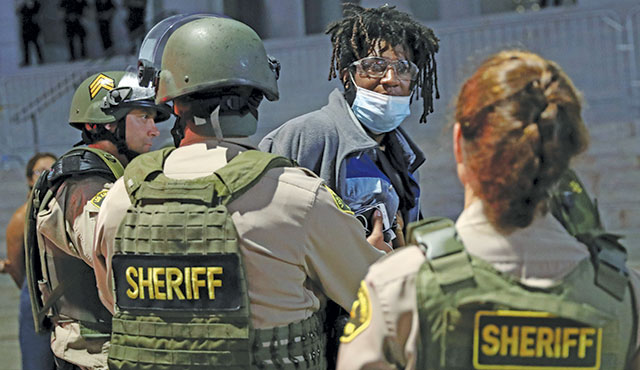Editor’s Note: Cervantes, Ji and Walgenbach are among the ministry leaders of the Diocese of Orange.
In recent days Pope Francis directed an address to all people in the United States, including Catholics, in which he said: “We cannot tolerate or turn a blind eye to racism and exclusion in any form and yet claim to defend the sacredness of every human life.” We find that to be a powerful statement, a direct indictment, and call to action. Our Holy Father directed those comments to all Americans; we will direct ours to fellow Catholics.
We all need to face what it means to identify and to dismantle racism, and that is a lifelong process and a difficult journey. Right now, we urgently need to understand racism as it is involved in the deaths of George Floyd, Breonna Taylor, Ahmaud Arbery, and so many others.
Rather than seeing discussions, dialogue, and even protests about racism as introducing division into our peaceable unified existence, it is important to understand that racism is an ideology that excludes. As Fr. Bryan Massingale put it recently, “If it were up to people of color, racism would have been over and done, resolved a long time ago. The only reason that racism continues to persist is because white people benefit from it.” This may be hard to hear, but it requires sustained reflection. We need to understand that to dismantle racism is to work to repair the deep divisions and injustice that racial ideology sustains.
Where do we begin? How do we start? By saying it out loud and admitting that black lives matter, just as strongly as we fight for the unborn. By reading the Gospel of Luke or re-reading the Beatitudes so they may transform our prayer and our actions. By praying that our lives would reflect the image of Jesus our Savior through word and deed.
The U.S. bishops give us concrete examples:
“All too often, Hispanics and African Americans, for example, face discrimination in hiring, housing, educational opportunities, and incarceration. Racial profiling frequently targets Hispanics for selective immigration enforcement practices, and African Americans, for suspected criminal activity. . . too often racism comes in the form of the sin of omission, when individuals, communities, and even Churches remain silent and fail to act against racial injustice when it is encountered.” (Open Wide Our Hearts)
If our repentance from racism does not address issues mentioned above, then we are not taking seriously the idolatry of whiteness in our society and even in the Church. While anti-racism training and policies are essential, ideas of ‘diversity’ and conflict resolution in and of themselves can often reinforce notions of ‘normal,’ which sadly do not include perspectives that do not fit with the dominant narrative. We do not claim to be able to scratch the surface of this monumental topic here but there are many anti-racism resources available for further education.
We conclude with a few recommendations. As Georgetown professor Dr. Marcia Chatelain, a panelist in a recent dialogue with black Catholic leaders, put it, “The Catholic Church in the United States knows everything that needs to happen to stop this problem, but there’s no political will and there’s no desire.” Let’s start by doing what we know. How will we ensure that voices of color are not only at the table, or represented, but are in places of leadership and decision-making? How will we look at our budgets – from local city budgets to parish budgets – to ensure that we are investing for the bienestar, the common goods of health, education, housing, etc., of all communities? That may mean not spending money in areas that traditionally have propped up one particular group at the expense of others. How will we pray for and with racial justice, ensuring that our liturgies reflect our intercultural communities and not mere tokenism? How will Catholics show up in the struggle against racism that is already happening in the world around us – perhaps like no other time in recent memory? We invite further reflection on these topics at usccb.org/racism and through many excellent anti-racism resources. We have no shortage of documents, trainings, and commentaries. What we need to do is act.
In the Diocese of Orange, Armando Cervantes is director of Youth and Young Adult Ministry, Linda Ji is director of Pastoral Care for Families of All Stages, and Greg Walgenbach is director of Life, Justice & Peace.

